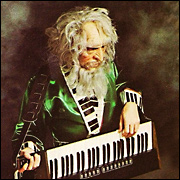|
Konstantin posted:I don't think it would have mattered, since within a decade or so you would have had a nuclear Nazi Germany and a nuclear US. I see that ending only one way, and it would make WWII look like a minor skirmish in comparison. No, there was no danger of Nazi Germany getting nuclear weapons before getting nuked. Being overrun before the bomb was finished was Nazi Germany's smartest move.
|
|
|
|

|
| # ? Jun 1, 2024 07:25 |
|
I think it's important to remember that the Nazis had no consistent, overarching plots for Eastern Europe other than mass murder. There were plans thrown about and very nebulous decrees like, "depopulate" or "Germanize" an area but nothing more than that until the Holocaust. You have to stop and ask yourself, "What the gently caress does that even mean or entail?" Most the Nazi leaders in those areas had the same question on their minds and didn't want to ask more questions than they had to because that weakness would leave them open to political attacks. They also probably knew that the people above them didn't know either and were just reciting Nazi jargon. In the Reichsgau Wartheland as previously mentioned, "Germanization" of suitable candidates occurred and others were usually deported. The Gauleiter, Greiser, saw used that method because he believed it would achieve the best results. In Reichgau Danzig-West Prussia, Gauleiter Albert Forster used mass extermination of non-Germans as a means of meeting the mission goals given to them. All the Gauleiters had different plans because no one above them was giving them clear or anything close to a plan. If they didn't achieve results, they would probably lose their jobs or worse. Konstantin posted:I don't think it would have mattered, since within a decade or so you would have had a nuclear Nazi Germany and a nuclear US. I see that ending only one way, and it would make WWII look like a minor skirmish in comparison. The Nazis were pretty far from developing a bomb in 1945. At that time, scientists couldn't even agree on how much fissionable material was needed or if it was even possible to bring about the reaction with what they had. I can't find the source right now, hopefully another goon can, but I also remember reading that some scientists involved in the project later claimed they lied and purposely made mistakes to keep Germany from getting the bomb. The other Axis powers were much farther from developing an atom bomb as well. Japan pretty much neglected their program in favor of biological and chemical warfare because it gave a faster return on their investments.
|
|
|
|
Cyrano4747 posted:Where are you getting this from? Yes, you are right. That's an interpretation based mostly on the personal ramblings of Hitler, Himmler and a few other nutjobs.
|
|
|
|
RocknRollaAyatollah posted:I think it's important to remember that the Nazis had no consistent, overarching plots for Eastern Europe other than mass murder. There were plans thrown about and very nebulous decrees like, "depopulate" or "Germanize" an area but nothing more than that until the Holocaust. As I've said before, this isn't really true. There was a very well directed resettlement campaign aimed at both the areas of Poland that were annexed directly into Greater Germany and the areas that were set aside for colonization (with an eye toward eventual annexation - it was very much done on the federal territory -> state model that produced the internal organization of the western US), and there were preliminary plans articulated and drawn up with regard to the Baltics and western Ukraine. The areas in the east nearest the front (Baltics, Ukraine) never got much beyond the discussion phase, but Poland experienced quite a bit more. The war very happily ended before we ever got a full view of what they would have done with the further reaches of the East had they been more successful, but they themselves were very self conscious about Poland being the testbed for the practices they would use out there later and documented the gently caress out of it. If you want to read more about the specifics of what went on in the annexed areas of Poland and in the General Government, I recommend "RKFDV: German Resettlement and Repopulation Policy 1939-1945: A history of the Reich Commission for the Strengthening of Germandom" by Robert L. Koehl. It's an older book and probably long since out of print, but any decent university library should be able to get a copy via Interlibrary Loan at the very least. quote:You have to stop and ask yourself, "What the gently caress does that even mean or entail?" Most the Nazi leaders in those areas had the same question on their minds and didn't want to ask more questions than they had to because that weakness would leave them open to political attacks. They also probably knew that the people above them didn't know either and were just reciting Nazi jargon. Again, there was a central organizing body, the RKFDV. As for specific plans and policies, they were well published. Certain aspects were made more open to the public than others (the execution of local intelligentsia, religious leaders, political leaders, and other cultural carriers was kept on the D/L for example), but they published books about this poo poo. Here is a nice sampling of a few that I have on hand as .pdfs, although there are a lot more.  Loosely: "Signpost in the new Danzig/West-Prussian homeland" - it's a general guidebook for ethnic Germans resettling to those areas. How to behave re: the locals, available local support in getting settled, etc.  "Germans! The East Calls You! The economic development opportunities in the integrated eastern territories of the German Reich." Basically a book length advertisement looking for qualified professionals to come fill all the various spots that need to be filled in your average scratch-built village.  "The struggle for life in the German/Polish border territories" Basically what it sounds like. How to deal with living on the frontier of the German Reich.  "National Socialist Foreign-Peoples Policy: The German man and the foreign peoples" Again, how to comport yourself re: the locals. This wasn't just the vague mumblings of a few beer hall buzzards in the 20s or post-dinner tabletalk wank sessions between general staff members in the early 40s. This was real policy that was written down, enacted, and which had centralized offices to carry it through on the ground. Now, when you mention all the Gaulleiters having different priorities you're flirting with Kershaw's "Working towards the Führer" hypothesis. I generally agree with Kershaw here, but what you have to remember is that it's not an iron clad either/or approach. There were some issues that Hitler was wonderfully vague on, leaving people to decide on their own policies in a kind of "What would Hitler do?" fashion. Then there were others where they had a clearly articulated state policy and clear steps were taken to achieve it. The Holocaust is the most famous example of the former; resettlement and the systematic destruction of a Polish national identity is a solid example of the latter. quote:If they didn't achieve results, they would probably lose their jobs or worse. I strongly disagree with the "or worse" part of that, and what it implies. Say what you will about the Nazis (insert Big Lebowski joke here) but they weren't Stalinist Russia. Purges (well, physical purges - more on professional purges in a moment) within their own ranks wasn't their style. Someone who indicated that they weren't on board with the current plan didn't face the possibility of the camps or execution, what they really faced was marginalization. Most of my own work has had to do with German educational administrators and there were a ton of those guys who got frozen out during the Nazi years. A comment of "staatspolitisch nicht zuverlässig" ("~Politically unreliable") one one's file was the professional kiss of death. There would be no more promotions, and quite possibly some ugly transfers or positions generally below what a person of your experience and education should expect were in your future. Now, this shouldn't be confused with people who were identified as actively anti-Nazi. The thing is that those people didn't last through to the mid 30s. THe vast majority of them were fired from governmental positions in 1933. If they were lucky they got the hint and spent the next 12 years very quietly trying to get by doing whatever menial jobs they could or they emigrated before 1939. If they persisted in their political activities (as a lot of KPD members did) or were a major enough political figure in '33 they'd probably find themselves in a camp by '38. The key is, though, that that is a totally different process than how they dealt with normal people who simply balked at the uglier demands made by the Reich.
|
|
|
|
I'm mostly going off of Kershaw but if there was a central organizing committee that was controlling everything, why were the Gau's so different in terms of policy execution? How effective was this organization in directing policy in the Gaus because the Gaus were pretty much feudal fiefdoms from what I've read? Greiser for instance almost went out of his way to deem certain people "German" so they wouldn't have to deal with relocating them or murdering them. This isn't to say he was a saint, the man was involved in the Holocaust but he wasn't Forster. Forster on the other hand went with mass murder. Cyrano4747 posted:I strongly disagree with the "or worse" part of that, and what it implies. Was the Night of Long Knives that far gone from the consciousness of Nazi party members after that short of time?
|
|
|
|
I need to run and take care of a bunch of stuff so I don't have time for a real effort post on the Gau issue. The super tl;dr version is that all of these bodies are operating in parallel. Yes, Gau leadership can vary quite a bit with regards to how it implements this policy or that policy, but in a lot of areas it also has to contend with a bunch of other competing (and sometimes conflicting) authorities that have specific portfolios. Resettlement policy is one of those areas where there's a specific office that's trying to coordinate this poo poo on a broader scale. RocknRollaAyatollah posted:
The night of the long knives was a one-off event during the period when the party was consolidating its power within Germany. Basically it sorted out the SA/SS rivalry once and for all and was also convenient cover for what amounted to a miniature coup against certain conservative elements of the German political class that the Nazis thought weren't on board with the program. While they were at it they got rid of a few politically embarrassing remnants of the oldest iterations of the Party. It wasn't a way of punishing or purging individuals who somehow failed in their jobs a la Stalinism. It was the end stage of a very specific battle for power between Röhm and Heydrich/Himmler and a general political house cleaning to ensure that they had firm footing in the new government. The key is that it wasn't a punishment for refusing to do a duty or being a fuckup in some way, it was a specific strike against specific individuals for pre-existing political ideologies or convictions. This isn't your local Gauleiter getting two in the ear for failing to meet a quota, this is offing an old rival because you don't want him attempting a coup a few years down the road.
|
|
|
|
Cyrano's absolutely right, you could be a gigantic fuckup in Nazi Germany and they wouldn't send you to a camp or shoot you over that.
|
|
|
|
*cough*Heß*cough*
|
|
|
|
JaucheCharly posted:*cough*Heß*cough* Self-inflicted.
|
|
|
|
What was the relationship between the Nazi party and the Wehrmacht like? Were members of the Wehrmacht expected to join the party?
|
|
|
|
JaucheCharly posted:*cough*Heß*cough* I'm not super cool and don't get what you're referencing. Are you talking about Rudolf Hess?
|
|
|
|
Last Buffalo posted:I'm not super cool and don't get what you're referencing. Are you talking about Rudolf Hess? Rudolf Höß. Shouldn't forget the umlaut. EDIT: I assume that's who we're talking about? Not exactly what springs to mind when you say 'sent to a camp'. dublish fucked around with this message at 05:58 on Sep 13, 2014 |
|
|
|
Kemper Boyd posted:You could be a gigantic fuckup in Nazi Germany and they wouldn't send you to a camp or shoot you over that. I'm speaking of Rudolf Heß, Stellvertreter des Führers. A name that should instantly pop up when talking about fuckups and crazy.
|
|
|
|
One thing that remains a mystery about Hess is how some Nazis today worship him. I don't get it.
|
|
|
|
Kemper Boyd posted:One thing that remains a mystery about Hess is how some Nazis today worship him. I don't get it. He was trying to make peace with ~~fellow Aryan brothers~~. If he had been successful you don't get England as a permanent threat from 41-44, no easy invasion route, no western front, and ideally get a victorious Germany in the east. That's delusional, but whatever we aren't exactly talking about Rhodes Scholars here. That, plus if you're the sort of guy who lives in the shittier parts of mid/north England, votes BNP, and strokes himself to sleep thinking about beating up on the local Pakistani shopkeeper it lets you construct a "might have been" alternate history narrative where Hess is successful and all the right-thinking British conservatives team up with Hitler to fight the real threat. brozozo posted:What was the relationship between the Nazi party and the Wehrmacht like? Were members of the Wehrmacht expected to join the party? Short answer: no. The Wehrmacht and the party were two very distinct entities. Hell, that's the root of the whole Wehrmacht/SS competition for resources and field authority. The Wehrmacht was just the German military, full stop, and as such could trace its history back to 1871, and back further if you buy the Imperial Prussian Military => Unified German Military line of thinking. Hell, early on there were actually regulations, hold overs from at least the Weimar Period and I think even the Kaiserreich, that maintained that people in the military couldn't be members of any political party. Under the Nazis they obviously ignored the hell out of that and eventually got rid of it, but it was a thing. The other thing to remember is that actual party membership wasn't as super-common as people assume. They topped out around 8 million in 1945, out of a pre-war population of ~80 million. Now, this doesn't mean that people didn't believe in or support the Nazi political movement, they just didn't bother to join up and do all the extra party poo poo. How many staunch Republicans or Democrats do you know who are actually active in the party (volunteer to work for it, act as local party delegates, etc) rather than just ticking the appropriate box once every four years? It's a poor comparison because political party membership works very differently in the US than in most parliamentary systems of that era, but it gets the point across. On the other hand, once you get past Gefreiter Joseph Blasen and into people looking at the military as a career then things start to get a lot more political. I don't know numbers for how many officers etc were party members, but it wasn't freakishly uncommon or anything. All that said, don't think that this is a back door back into the "Clean Wehrmacht" myth. There might have been a lot of regular guys just trying to get by who got drafted into the Wehrmacht in 1943 or whatever and coudln't give two shits about politics, but there are also a lot of accounts of totally normal dudes without party affiliation etc. engaging in some loving awful atrocities against civilian populations, POWs, and other non-combatants.
|
|
|
|
Cyrano4747 posted:He was trying to make peace with ~~fellow Aryan brothers~~. If he had been successful you don't get England as a permanent threat from 41-44, no easy invasion route, no western front, and ideally get a victorious Germany in the east. That's delusional, but whatever we aren't exactly talking about Rhodes Scholars here. I was thinking more along the lines of the current "intellectual" Nazis, you know, guys who dress fairly normal and listen to neofolk.
|
|
|
|
Kemper Boyd posted:I was thinking more along the lines of the current "intellectual" Nazis, you know, guys who dress fairly normal and listen to neofolk. Either way, nazi dipshits who idealize Hess tend to do so because he was trying to make peace with England, who they slot in as "fellow Aryans we should have been allied with rather than fighting." edit: well, I won't say 110% of the time because I don't specialize in neoNazi fuckwits and do my best to ignore them. There could easily be the odd group making a novel argument. If you have some specific subset of mouth breathers who are saying something different about Hess in mind, just come out with it.
|
|
|
|
Cyrano4747 posted:Either way, nazi dipshits who idealize Hess tend to do so because he was trying to make peace with England, who they slot in as "fellow Aryans we should have been allied with rather than fighting." Nah, I think you're probably right. One thing that I remember seeing now is neo-nazis making a big deal out of how ~poor Hess~ was locked up in Spandau for so long despite the "fact" that he was all ~innocent~. And good call on ignoring neo-nazis, because reading poo poo by those guys will rot your brain. That's why I decided to not write my master's about nazis.
|
|
|
|
His death and the flight to England were supremely
|
|
|
|
I realize this thread has been inactive for months, but i checked the rules thread and didn't see anything about necroing and it hasn't hit the archives yet so... I finally finished reading through this and found it very informative, but I had a couple q's for you guys. Are there any good biographies on Goebbels, Himmler, Heydrich, and Eichmann that y'all would recommend? They've all been talked about in here, but I never saw suggested reading material on them posted. As someone who's only real exposure to the details of Nazi Germany has been this thread what would be the suggested reading order for -Mein Kampf -Kershaw's Hitler books -Evans' Third Reich series Tangent to that, how important is it to read Mein Kampf? Will the other books cover it in enough detail to make doing so unnecessary, or does it still hold significant value in terms of understanding Hitler and his/Nazi ideology? And thanks to everyone who originally contributed!
|
|
|
|
Mein Kampf is wholly unnecessary unless you're a masochist. Just read a good biography of him (the Kershaw one is great if you're into door stoppers) or any halfway decent general history on Nazi Germany and you'll get all the coverage of it you could want.
|
|
|
|
Seriously Mein Kampf is poorly written trash and all the understanding of national socialism you need is that it was whatever stupid poo poo Hitler thought up that day with a side of antisemitism.
|
|
|
|
Raskolnikov38 posted:all the understanding of national socialism you need is that it was whatever stupid poo poo Hitler thought up that day with a side of antisemitism. I wouldn't go that far, it did have its own internal logic if you get deep enough into it. Still, Mein Kampf isn't the place to go to for an intro to that way of thinking. edit: If you want a good into to the political philosophy behind National Socialism and why it resonated with Germans so well in the 20s and 30s pick up Peter Fritzche's Germans into Nazis. edit x2: The Racial State By Burleigh & Wippermann is also really great. I think Fritzche is a little easier to work with myself. edi x3: Claudia Koonz The Nazi Conscience would round out a three book reading list on National Socialist thinking quite well. Cyrano4747 fucked around with this message at 02:00 on Dec 4, 2014 |
|
|
|
Okay, thank you for the suggestions (and the warning about MF) but maybe I need to clarify: I have the Evans and Kershaw books listed because I am interested in the general history of the Nazi regime and the biography and ideology of Hitler, but not just the ideology, and I was curious as to whether it would be more beneficial to read Evans' general history first before diving into Hitler himself. (As an aside, my winter break is about to start so length isn't a big concern of mine). Regardless, thank you for the suggestions and they've been added to my reading list. Any suggestions for biographies on the other men I mentioned? Goebbels, Himmler, Heydrich, and Eichmann
|
|
|
|
If you're interested in general history biography really isn't a good place to start for a whole host of reasons. If you want to understand the general history of Germany from the end of World War 2 to 1945 I would start out with Germans into Nazis to give you a good grounding in the context that everything else comes out of and move from there into any specific interests you have past that.
|
|
|
|
I'd recommend Brigitte Hamann's "Hitler's Vienna". It treats H.'s teenage years and his ideological roots.
|
|
|
|
Cyrano4747 posted:If you want to understand the general history of Germany from the end of World War 2 to 1945 I would start out with Germans into Nazis to give you a good grounding in the context that everything else comes out of and move from there into any specific interests you have past that. JaucheCharly posted:I'd recommend Brigitte Hamann's "Hitler's Vienna". It treats H.'s teenage years and his ideological roots.
|
|
|
|
Nice to see this thread still exists. I've read both Evans and Kershaw, and would suggest reading Evans first for an excellent overview, then start Kershaw for more in-depth coverage of Hitler and how Nazism worked. Feel free to sample MK, but don't start until after you've read Evans. The important thing is not to emphasize MK's importance too much - that way lies "Great Man Syndrome," which derails study of Nazi Germany way too much and you don't want to be a part of it if you're truly trying to figure all this poo poo out. It's not just all about Adolf's failed art career. 
|
|
|
|
Gumby posted:Nice to see this thread still exists. Gumby posted:I've read both Evans and Kershaw, and would suggest reading Evans first for an excellent overview, then start Kershaw for more in-depth coverage of Hitler and how Nazism worked. Feel free to sample MK, but don't start until after you've read Evans. The important thing is not to emphasize MK's importance too much - that way lies "Great Man Syndrome," which derails study of Nazi Germany way too much and you don't want to be a part of it if you're truly trying to figure all this poo poo out. It's not just all about Adolf's failed art career. And I'll ask one more time, now that we've gotten that part out of the way. And just to make clear, I want to read biographies of these men just because I want to know about them. Not as a replacement to a general history. Titles suggested would be added to the list and I'll get to them after I've read the important stuff first lol quote:Any suggestions for biographies on the other men I mentioned? Goebbels, Himmler, Heydrich, and Eichmann site fucked around with this message at 21:00 on Dec 5, 2014 |
|
|
|
I'm thinking of quotes that hardly anyone read MK at all. It played next to no role, but it made H. rich in the time after he became chancellor. I don't know if you understand german, but MK is really tiresome and poorly written. A few years back, I was on a friend's bd party out on the countryside. His mom owned the house and nobody ever lived there, beside in summer sometimes. So, I'm there on the couch way past midnight. Kinda bored and higher than the highlander, because everybody already went to sleep. I notice a bookcase. Man, what a curious find. I guess nobody ever cared to look what they had there, but it was like 5 collected volumes of some local nazi periodical, bound in leather. Didn't memorize the title. If you think that MK is badly written and poorly thought out, you should have seen this stuff.
|
|
|
|
MK really didn't play a central role in winning anyone over to Nazism. It wasn't some kind of Nazi bible or the like where people read it and decided to go off the political deep end - an anti-Semetic Atlas Shrugged it was not. The how and why of the Germans deciding Nazism was the direction they should run with is a lot more complex than that. Someone could do a huge effort post on it, and I'm sure it would be interesting, but really just read Germans into Nazis if you want a good, solid grounding in the topic. It's a controversial field and people can (and will) argue to no end about the particulars, but that's a really great starting point. The one thing I do feel a bit compelled to add is that you need to think of the period from 1918 to 1945 as a whole sequence of distinct political phases rather than some kind of ramping up of support for a growing movement, or something. A bunch of issues went into the explosive growth in popularity of National Socialism between 1928 and 1933, but at no time did they get the majority of the vote. The actual government takeover was largely the result of some really loving awful and childish parliamentary tactics on the part of the parties that were opposed to the NSDAP (especially the Center Party and the SPD) and the final stroke was a completely bullshit backroom deal that can very reasonably be described as a 'seizure of power.' Note that I'm not getting into any kind of issues surrounding culpability for what comes later here; that's an entirely different issue. I'm just emphasizing that as of 1933 when Hitler assumed national leadership the Nazis didn't have majority support in Germany. This is part of why I emphasized how you need to compartmentalize this era. After 1933 you get into all sorts of other hosed up issues like opportunistic party membership, using the state apparatus to buy political support, the marginalization of ethnic and political 'others,' and state sanctioned terror as a means by which society can be shaped in a direction amenable to a particular political party or leader. What does this have to do with the ideology aspect you seem so interested in? A lot, because ideology perversely becomes less important for explaining party participation - including in the most awful policies and actions of the 3rd Reich - once they're actually in power. You don't need to necessarily hate jews to be in favor of expropriating their belongings if you think you might be able to get some cheap furniture or take over the lease of the apartment next door once they get shipped to a ghetto. This is something that scholars have really been emphasizing more recently, but people back then recognized it as well. It's the core distinction that was being recognized when the Nazis themselves distinguished between the rank-and-file and the 'Alte Kämpfer.'
|
|
|
|
JaucheCharly posted:I'm thinking of quotes that hardly anyone read MK at all. It played next to no role, but it made H. rich in the time after he became chancellor. I don't know if you understand german, but MK is really tiresome and poorly written. Cyrano4747 posted:MK really didn't play a central role in winning anyone over to Nazism. It wasn't some kind of Nazi bible or the like where people read it and decided to go off the political deep end - an anti-Semetic Atlas Shrugged it was not. All I was ever taught in general history courses about Nazi Germany was focused on the ideological stuff, and the Holocaust obviously, and I need to work on getting out of that mode of thought. I do find the subject of totalitarianism, fascism, authoritarianism, etc. and how that works both from the government side, and how it interacts with/is accepted by the populace fascinating though.
|
|
|
|
I just wanted to mention that I've been following this thread and am glad it is still around. I'm very interested in what it was like for the people living in Germany, their attitudes towards nazi policy etc. What was the justification, if any, for the policies of the government made by the people living in Germany? The more I read about it the more I feel I can relate to it (I live in a country that uses death camps against an other and sends police to find these others living in the community to take them to the death camps).
|
|
|
|
What are some controversial issues in the field? I'm not talking about holocaust denialism, but about things like Functionalism vs. Intentionalism. What's the stuff reasonable people actually can have different opinions about these days? Both wrt. the Holocaust and 33-45 Germany in general.
|
|
|
|
Cingulate posted:What are some controversial issues in the field? I'm not talking about holocaust denialism, but about things like Functionalism vs. Intentionalism. What's the stuff reasonable people actually can have different opinions about these days? There are bunches, mostly surrounding different interpretations or different ways of understanding various phenomena. There has also been a shifting of more recent scholarship due to certain subjects just getting written about a whole bunch over the last 20-30 years and the simple need of up and coming scholars to get dissertations and books to their name. For example, the camp system has been poured over and analyzed to an extent that it's really hard to make a dent in that field, so a lot of younger scholarship has moved to looking at the holocaust as it unfolded in the east - the crimes of the local police units, the crimes of the Wehrmacht just behind the front lines, and other components of what some have begun to describe as the "Holocaust of Bullets." In many ways this is actually much more interesting than the almost historically unique industrial-scale slaughter that took place in the camps. Man has killed off unwanted civilians with whatever tools or weapons they had on hand practically since the dawn of organized warfare, which makes studies of the way the crimes in Eastern and Central Europe unfolded between 1939 and 1942 have extremely easy to see implications for understanding more contemporary events. As for what you actually asked, disagreements and controversies within the broad field of studies on Germany '33-45 in general, a lot of it boils down to how the government ran. You already mentioned intentionalsim vs. functionalism, but you have other issues such as what the real power dynamic was like between state and Party apparatuses, how to best understand and explain the rightward shift in German politics in the late 20s, what the legacy of National Socialism was (and remains) in Germany, how this legacy differed/differs in the BRD and former DDR, etc. Plus you have the inevitable revisiting of old, seemingly dead debates. It's taken as somewhat of a truism that the Sonderweg thesis is kind of a dead duck these days, but there are some younger scholars out there starting to contend that maybe it wasn't a completely ludicrous notion and that some essential truths got thrown out when the earliest, most deterministic formulations of it were dismissed.
|
|
|
|
site posted:
Just a heads up site that the Evans trilogy is not an easy task to take on. The 3 volumes are pretty massive. I don't have my books with me so I can't recommend something smaller atm, but a good place to look is in the second hand stores for general books and university texts on the third Reich. Unless it is The Rise and Fall of the Third Reich. That book is not going to give you a good understanding at all.
|
|
|
|
I went to a used book sale earlier today and snagged an English translation of some 1937 book titled Germany's New Religion. It's some real obtuse stuff, and seems to mumble about True Germanic Faith while never completely denying Christianity. Did this stuff ever catch on outside of certain fanatical cliques, or was this something even most party members just kind of muttered "mm-hmm" to and then carried on with whatever else they were doing?
|
|
|
|
No, it never really caught on. Yeah, Himmler and a few others were dreaming of a glorious neo-pagan Germania, and there was an attempt to create a pro-nazi "positive Christianity" that shed most of the old testament, jewish influences, but it never went anywhere. Hitler and the higher-ups were really sensitive to anything that might upset ordinary Germans, and went out of their way to not rock the socio-cultural boat too much. It's hard to overstate just how pragmatic and opportunistic Hitler & Co were once they got a whiff of power - hence the purging of the party radicals in the Night of the Long Knives etc.
|
|
|
|
Ofaloaf posted:I went to a used book sale earlier today and snagged an English translation of some 1937 book titled Germany's New Religion. It's some real obtuse stuff, and seems to mumble about True Germanic Faith while never completely denying Christianity. Did this stuff ever catch on outside of certain fanatical cliques, or was this something even most party members just kind of muttered "mm-hmm" to and then carried on with whatever else they were doing? Not really. Bishop Müller was considered even by Hitler to be kind of a fuckup. The Protestant Church also splintered, with the Confessing Church leaving the nazified church.
|
|
|
|

|
| # ? Jun 1, 2024 07:25 |
|
Can this also be the catch-all World War II thread? I was listening to Coast to Coast AM, this morning, and the guest was absolutely spraying crazy all over the place. Here are some of his claims: - The reason America could not declare war in Vietnam, which caused us to lose that conflict, is that we are still "at war with the Third Reich in exile." This is why we have not been able to declare war on anybody at any time since World War II. Apparently, we are still officially engaged in WWII, and we are not allowed to be at war with two places for reasons. - The fact that we are in a perpetual state of war with the Third Reich in exile is also why presidents get to keep issuing "extralegal" orders. If we were ever in peacetime, again, all of these crazy things like income tax would go away or something. - If the United States had not sought peace with Japan in 1945, the Japanese would have wiped us out with some sort of (nuclear?) super-weapon. - Thousands of Japanese-American citizens were worked to death as part of a program that forced them to build homes for displaced Native Americans - The United States instigated the attack on Pearl Harbor by making air raids on Japan in order to force our entry into the war. - The ships sunk at Pearl Harbor were all aging WWI machines that were nearing uselessness. The man making these accusations quoted some Japanese military official as saying he had never before seen so many ships chained together in such a small space, and it was obvious that they were meant to all sink if one did. - The above ships were crewed entirely by under-18 swabbies who were sacrificed as part of the get-us-into-the-war effort. A further claim was made that sailors were heard tapping Morse code on the hulls of the downed ships for weeks after they sank. The rescue divers and crews were under strict orders to let the kids die, so there would be no witnesses to the fact that the hulls of the ships had all been covered in explosives just in case the Japanese couldn't get the job done and sink them all. - The USS Enterprise and some other carriers were part of some strange ambush that the Japanese somehow got wise to after noticing that Pearl Harbor was full of decoy ships. I didn't quite grasp what this was all about. So, what was this mighty Strangeloveian weapon the Japanese were about to unleash on us? How did we sneak all those dead sailing youth under the public's radar? What strides have we made toward locating the Third Reich in exile? How does this all tie in with Satanic chaplain Michael Aquino, who apparently reached some very high level of clearance in the NSA and turned the armed forces into Satanists, or warlocks, or something? The "historian" in question is Douglas Dietrich. He knows all of this because he was in charge of destroying documents for the Department of Defense library at the Presidio, which was built on desecrated Indian burial grounds.
|
|
|
|


























